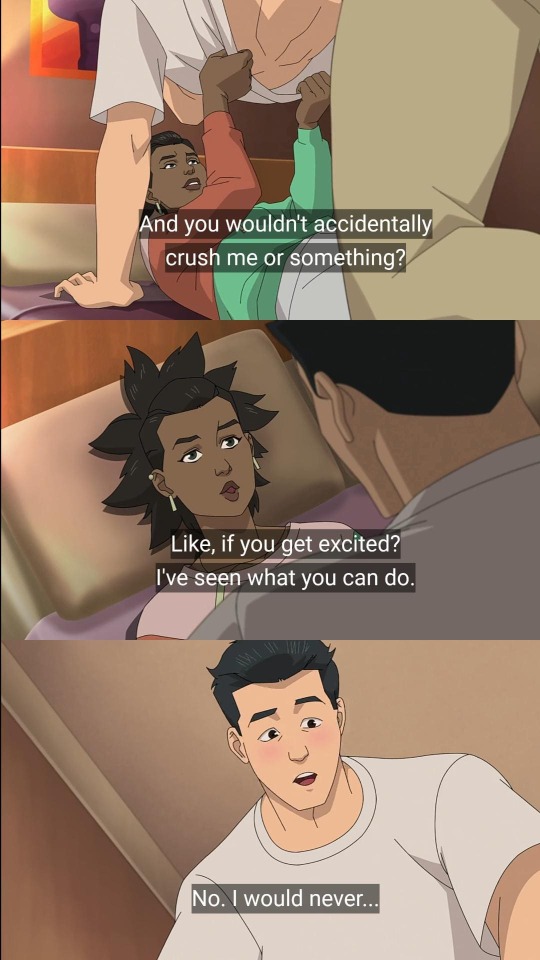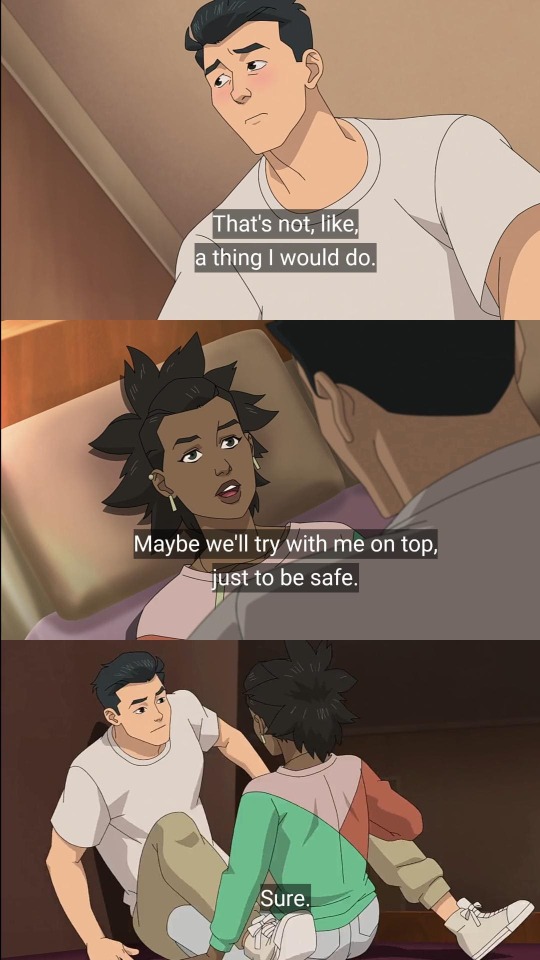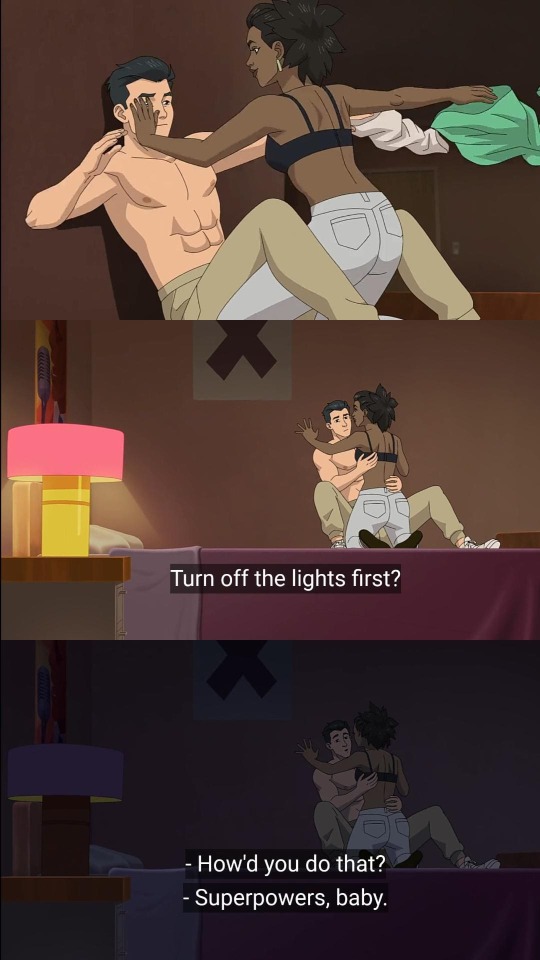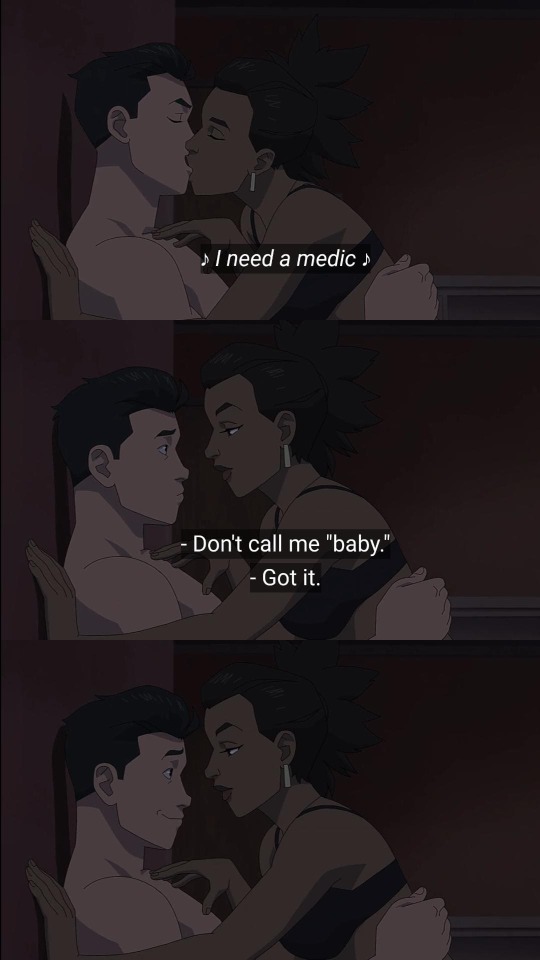My Headcanon About The Alternate Timeline We See In S2ep7 Is That Instead Of Ekko And Powder Being Close
my headcanon about the alternate timeline we see in s2ep7 is that instead of ekko and powder being close friends throughout their childhoods who became lovers with no friction, it actually took a while for them to bridge the gap that vi's death caused.
when we see ekko and powder go to vi's memorial for the first time and ekko asks if she was the one who caused their death, powder very quickly retorts that it was ekko's tip that ended up sending them on the job that killed her. i think that this is important not just because the writers wanted to explicitly say that the chain of events that led to the original timeline hinged on ekko's tip but also because in how quickly she said it, we can assume that this is something that's come up between them before.
ekko already is seen as a character who carries a lot of responsibilities on his shoulders, mostly self-ascribed, which i tend to characterize as being born partially of guilt. i think guilt is a large part of his character and it would be somewhat irresponsible to shrug that off when speaking about his character in the alternate timeline that the original ekko drops in on.
powder is characterized as brighter and happier than jinx when she grows up in this universe with a support system, obviously, but she still has a tendency to anger. this is shown through how she tells ekko to get out before she does something she'll regret rather than rolling over in the face of his interrogation and insensitive statements. she also holds a grudge, as we see it takes ekko physically taking her to see vi's painted memorial in the firelight lair before she stops scowling at him in the bar and warms up to him again.
looking at all of these things, i think it's a fair assumption to make that following vi's death, there was a period of time where powder directly blamed ekko for what happened, and that ekko blamed himself as well. this, in my opinion, doesn't cheapen their relationship when they grow up into the people we see in s2ep7, but deepens it.
i think the act of forgiving is something that takes a long time, whether you're forgiving yourself or someone else, and ekko and powder's relationship being as comfortable and easy as it is in s2ep7 speaks to the fact that they had a long stretch of time to get to that space where they could move past the circumstances that led to vi's death. at least, they both do until original timeline ekko drops in and reopens that wound, which in turn leads powder to throw blame back in his face, similarly to how i assume she must have done directly following vi's passing.
the idea that powder and ekko in this alternate timeline had to move past anger, grief, guilt, and blame makes their relationship feel more heartfelt than if they were locked in since day one and there was no more work to be done. love as something that has to be earned and worked for even in a world where things seem mostly ideal shows that it wasn't just a fluke that they got together but a deliberate continuous choice to work through trauma to allow themselves to be together.
it also legitimizes the idea that original timeline ekko and jinx could hypothetically be together as well. not just because we see "oh, one version of powder and ekko can get together so this one can, too" but because both versions have baggage to work past before getting together, but the universe we see displays how this pair managed that with the luxury of a support system and a kinder environment that original timeline ekko and jinx unfortunately weren't afforded.
i think this also makes their team-up in s2ep9 more heartfelt because we can see ekko move past blame when he comes back for jinx to help in the fight, similarly to how i assume ekko in the alternate timeline had to work through his own to eventually get together with powder. both relationships hinge on the fact that they have to put effort in to get comfortable with each other following the consequences of the job that ekko sent them on rather than letting the alternate universe relationship ultimately act as a fluke that can't be replicated because of how drastically different that world is.
More Posts from Xynnietheslut and Others




The pause to make sure, the communication, voicing out preferences, setting the mood, following said preferences, and being safe (both with powers and the condom). You guys don't know how proud I am of them-
Maybe I'm in my own echo chamber but I'm so glad more people are starting to realise how annoying and absolutely hateful the marauders fandom is and how much damage ATYD did for it AND the Harry Potter fandom in general. When did this fandom turn into a Wolfstar and Jegulus digital shrine? So many interesting characters and stories and opportunities to explore and you choose to regurgitate what a random fic incorrectly tagged as canon complaint says?
I'm not even joking, it has gotten to the point where literal adults with fully functioning brains lack the comprehension abilities to form their own opinions about characters.
I'm not saying that people arent allowed to enjoy non canon compliant work because they absolutely are and I encourage it because that's the whole point of a fandom and fanfics in general but it also goes the other way around when fans start raging at you because you tell them to engage with something outside of ATYD for once and to explore characters beyond somebody else's scope.
It's annoying when you arent allowed to have fun or post a character without somebody bashing you for liking them and redirecting their hatred for a character AT YOU.
For example, ATYD paints Snape as a rich, stuck-up pureblooded fascist creep who deserved to get bullied when its actually the exact opposite and everybody goes along with it.
ITS BORING AND REPETITIVE. It takes away so much fun from a fandom.
Pls ppl. I am begging you to open your minds up a bit and think for yourself instead of regurgitating some rando's opinion in order to fit in.
Also, what's up with critiquing everybody and their mother for not agreeing with your boring ass ship??

GUYS FORTICHE LIED TO US THIS IS THE REAL ENDING SCENE OF ARCANE
source: the producers and the guys at Riot told me personally
I don't know how this went down in the comics, except that Conquest didn't get as much development into his emotional state as he did in the show. It would be a waste if the TV series didn't take this opportunity to expand on his character further and create the most toxic Old Man Yaoi that the world has ever seen.


Cecilquest


so uhhh. yeah.

crawlin back to you

sorry not sorry. i love their dynamic
The Class Dynamics between James Potter and Severus Snape: A Critical Analysis:
This is a dedication to all those who say that class has nothing to do with the bullying that James exerted on Severus, to those who claim that James couldn't be classist because "he never proactively despised anyone for being poor" or because "he was friends with Remus," to those who say "Snape also attacked him" or suggest it was a "rivalry" and that they were on equal footing, or simply to those who say they are "fictional characters" and that fiction has nothing to do with reality, blah blah blah. This is something I have written with bibliographical references because, once in a while, I can stop being a simp goof and show off my university degree in political science. And yes, I am going to be an authentic pedant because I can, and because many people seem to live in a candy-coated world regarding these issues, and it wouldn't hurt them to get a bit educated. That said, here goes my essay:
When analysing the interactions between James Potter and Severus Snape in the "Harry Potter" universe, it is common to find vehement defences of James, arguing that his bullying was not class-motivated. However, it is crucial to untangle how class dynamics operate structurally and how this influences interpersonal relationships. James Potter, as a member of a wealthy, pure-blood family, represents the dominant class, while Severus Snape, coming from a poor, working-class background, embodies the subordinate classes. In the magical world, pure-blood lineage is associated with inherited privileges similar to aristocracy in the real world, where blood purity is a marker of status and power. Authors like Anderson and Löwe (2006) have explored how heritage and lineage have been determining factors in the distribution of power and privileges throughout history, both in fictional and real contexts. This socioeconomic background plays a crucial role in the power dynamics between characters like James and Severus, highlighting how class structures affect their interactions and perpetuate inequality.
Social class, according to Marxist analysis, is a structural category that determines individuals' positions within society based on their access to the means of production. In "Harry Potter", pure-blood status equates to magical aristocracy, while Muggle-borns, Half-Bloods with muggle parent and those from humble origins, like Snape, represent the working or marginalised classes. James Potter, on the other hand, embodies the privileges of the elite, not only through his wealth but also through his lineage, which grants him a status that influences his interactions with others.
The bullying James exerts over Severus cannot be disconnected from its socioeconomic context. Although James may not have explicitly expressed disdain towards Severus for being poor, the way he exploits his superior position to humiliate and subdue Severus reflects power dynamics based on class. Pierre Bourdieu describes how power structures are reproduced through symbolic violence, where the dominant classes impose their cultural and social legitimacy over the subordinate ones, perpetuating inequality. In the context of 'Harry Potter', this symbolic violence is reflected in how the magical aristocracy imposes its values and norms on those of humble origin. The public humiliations James inflicts on Severus are not just acts of bullying but also manifestations of a structural power that favours the privileged like James. Besides Bourdieu, other theorists such as Michel Foucault could provide complementary perspectives on how power is exercised and perpetuated in institutions, in this case, Hogwarts as a microcosm of magical society.
In James and Severus's case, this symbolic violence manifests in the public humiliations James inflicts on Severus, using his status to ensure there are no significant repercussions. James's position as a popular and privileged student grants him social immunity that Severus, due to his humble origin, cannot counter. This demonstrates how class structures influence the dynamics of school bullying, where resources and social capital determine which behaviours are acceptable and which are not.
The "Harry Potter" fandom often minimises James's actions, portraying him as a mere prankster without malice, while pathologising Severus's response, attributing it to resentment and bitterness. This narrative reinforces the whitewashing of the actions of the rich and popular to the detriment of the poor and marginalised. Theodor W. Adorno and Max Horkheimer, in their "Dialectic of Enlightenment", explain how the culture industry and hegemonic discourses contribute to naturalising domination relationships, presenting them as inevitable or even fair. Their analysis reveals that modern media perpetuates class dynamics by presenting power structures as natural and immutable. This can be observed in how the dominant narrative in the 'Harry Potter' franchise tends to glorify high-class characters like James while marginalising figures like Severus, whose resistance to the system is viewed with suspicion or disapproval. Contemporary studies, such as Mark Fisher's "Capitalist Realism" (2009), also highlight how media reinforces the current economic and social status quo, making it difficult to imagine alternatives to the existing system.
By justifying James's bullying as mere youthful pranks, the fandom perpetuates a narrative that excuses the abuse of power and classism, ignoring the impact these actions have on individuals like Severus, who are already in a structurally disadvantaged position. This reinforces social hierarchies and strips victims of their agency and dignity.
Severus's portrayal as a bullying victim is intrinsically linked to his social class. His marginalisation is not just a product of his actions or personal choices but a consequence of social structures that privilege figures like James Potter. Antonio Gramsci's theories on cultural hegemony are useful here to understand how the dominant class's ideas are imposed as normative, silencing the oppressed voices and legitimising the violence they suffer. In the 'Harry Potter' narrative, this hegemony manifests through the glorification of the values and behaviours of pure-blood characters like James, while the perspectives of the marginalised, like Severus, are dismissed or vilified. For example, the Marauders, led by James and Sirius, both rich pure-bloods, are portrayed as mischievous heroes despite their aggressive behaviour towards Snape, who is depicted much more negatively even when acting in self-defence. This reflects how cultural hegemony shapes public perception, perpetuating a value system that favours the privileged and marginalises the oppressed. Authors like Stuart Hall have explored how media and popular culture reinforce these hegemonic structures, underscoring the need for critical analysis to dismantle these dominant narratives.
Severus, in this sense, represents those who are constantly repressed by power structures and whose narrative is distorted to fit a worldview that favours the privileged. His resistance and eventual adoption of extreme ideologies can be understood as a response to this marginalisation, a desperate attempt to reclaim agency systematically denied to him.
To fully understand the relationship between James Potter and Severus Snape, it is essential to acknowledge the influence of class structures on their interactions. The narrative that minimises James's bullying and blames Severus perpetuates a simplistic and biased view that ignores the complexities of social inequality and power. By applying a critical analysis based on Marxist theories, we can unravel how classism permeates these relationships. Studies on young adult literature, such as those by Maria Nikolajeva, and the analysis of victimisation frameworks in popular culture by Henry Jenkins provide a theoretical framework that reinforces the need to re-examine fandom's conceptions to avoid perpetuating these structural injustices. These investigations highlight how narratives of power and oppression are often shaped by dominant interests and how this affects the public's perception of marginalised characters like Severus.
jayvik antis are so strange because if i acted the way they do towards eachother with my sister id be getting incest allegations yet theyre just brothers in their eyes

I think I'm really REALLY unwell.... why did I decide to binge watch Arcane s2? I HAVE NO IDEA
-
 teapenpage liked this · 1 month ago
teapenpage liked this · 1 month ago -
 soren1830 liked this · 1 month ago
soren1830 liked this · 1 month ago -
 maddiethefashionista reblogged this · 2 months ago
maddiethefashionista reblogged this · 2 months ago -
 maddiethefashionista liked this · 2 months ago
maddiethefashionista liked this · 2 months ago -
 thenewvision liked this · 2 months ago
thenewvision liked this · 2 months ago -
 heristerskeeper liked this · 2 months ago
heristerskeeper liked this · 2 months ago -
 nostarscancompare liked this · 2 months ago
nostarscancompare liked this · 2 months ago -
 httpsmeggg liked this · 2 months ago
httpsmeggg liked this · 2 months ago -
 forshadowthings liked this · 4 months ago
forshadowthings liked this · 4 months ago -
 ohmygoodnesslesbians liked this · 4 months ago
ohmygoodnesslesbians liked this · 4 months ago -
 v56e reblogged this · 4 months ago
v56e reblogged this · 4 months ago -
 skydomefr liked this · 4 months ago
skydomefr liked this · 4 months ago -
 crazygeniusme-blog liked this · 4 months ago
crazygeniusme-blog liked this · 4 months ago -
 a-tiny-wizard liked this · 4 months ago
a-tiny-wizard liked this · 4 months ago -
 pricesgirl liked this · 4 months ago
pricesgirl liked this · 4 months ago -
 ellie-is-a-nerd liked this · 5 months ago
ellie-is-a-nerd liked this · 5 months ago -
 rosyliixx liked this · 5 months ago
rosyliixx liked this · 5 months ago -
 salprieta liked this · 5 months ago
salprieta liked this · 5 months ago -
 liyaauhr liked this · 5 months ago
liyaauhr liked this · 5 months ago -
 naotofuyumines reblogged this · 5 months ago
naotofuyumines reblogged this · 5 months ago -
 gumiswifey liked this · 5 months ago
gumiswifey liked this · 5 months ago -
 vibrantmeadows liked this · 5 months ago
vibrantmeadows liked this · 5 months ago -
 materpulchra liked this · 5 months ago
materpulchra liked this · 5 months ago -
 tremendouscloudpandapatrol liked this · 5 months ago
tremendouscloudpandapatrol liked this · 5 months ago -
 lunalyric15 liked this · 5 months ago
lunalyric15 liked this · 5 months ago -
 thewardrobewriter liked this · 5 months ago
thewardrobewriter liked this · 5 months ago -
 cloudydaffodil liked this · 5 months ago
cloudydaffodil liked this · 5 months ago -
 dorahvante liked this · 5 months ago
dorahvante liked this · 5 months ago -
 springweeps liked this · 5 months ago
springweeps liked this · 5 months ago -
 jovialexpertwinnercash liked this · 5 months ago
jovialexpertwinnercash liked this · 5 months ago -
 butterfly-cadaver liked this · 5 months ago
butterfly-cadaver liked this · 5 months ago -
 fucking-leave-me-alone-pornbots liked this · 5 months ago
fucking-leave-me-alone-pornbots liked this · 5 months ago -
 avioncitodetergopol liked this · 5 months ago
avioncitodetergopol liked this · 5 months ago -
 dyingisnotanoptionyet reblogged this · 5 months ago
dyingisnotanoptionyet reblogged this · 5 months ago -
 not-aa-witch liked this · 5 months ago
not-aa-witch liked this · 5 months ago -
 akemicass liked this · 5 months ago
akemicass liked this · 5 months ago -
 syssie liked this · 5 months ago
syssie liked this · 5 months ago -
 robin-legacy liked this · 5 months ago
robin-legacy liked this · 5 months ago -
 annasideblog reblogged this · 5 months ago
annasideblog reblogged this · 5 months ago -
 blueskybehindtheclouds liked this · 5 months ago
blueskybehindtheclouds liked this · 5 months ago -
 indecisive-as-h3ll liked this · 5 months ago
indecisive-as-h3ll liked this · 5 months ago -
 hotcheetohatredwastaken reblogged this · 5 months ago
hotcheetohatredwastaken reblogged this · 5 months ago -
 rens-room liked this · 5 months ago
rens-room liked this · 5 months ago -
 403notfound liked this · 5 months ago
403notfound liked this · 5 months ago -
 cartoon-blog0203 liked this · 5 months ago
cartoon-blog0203 liked this · 5 months ago -
 cwjhunt liked this · 5 months ago
cwjhunt liked this · 5 months ago -
 atheniandrinkscoffee liked this · 5 months ago
atheniandrinkscoffee liked this · 5 months ago
